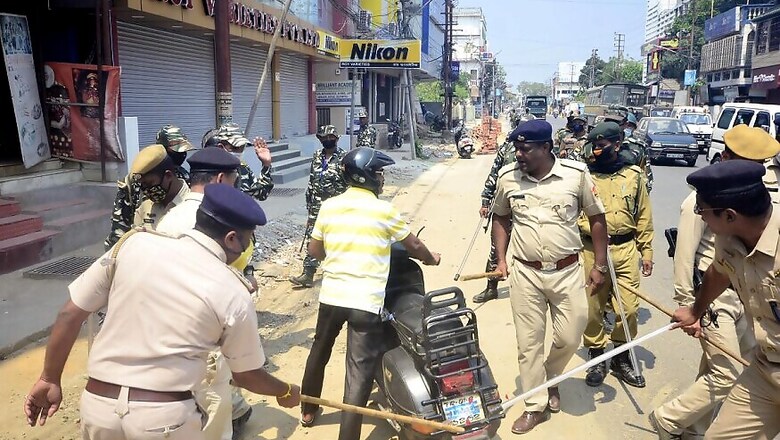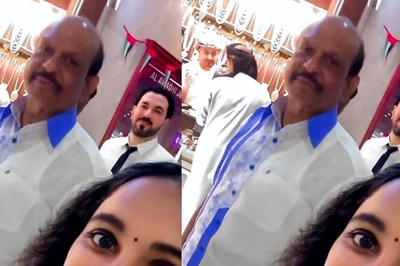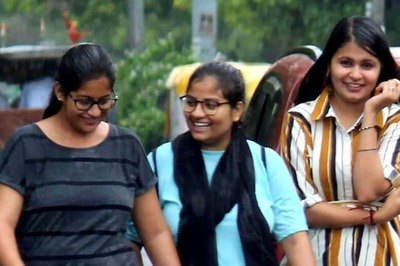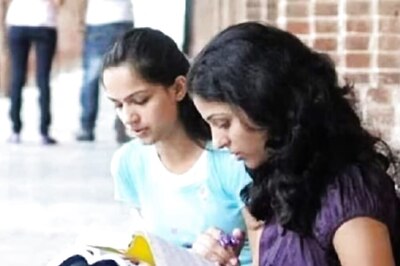
views
Remember the famous Kishore Kumar from Amar Prem, the Rajesh Khanna-starrer 1972 Hindi film, Chingari koi bhadke? The last stanza has an interesting thought: mazadhaar mein naiyyaa dole/to maanzee paar lagaaye/maanzee jo naaw dooboye, usse kaun bachaaye? (If the boat gets into choppy waters, the boatman steers it out of them, but what if he drowns the boat?).
In this time of crisis, the role of the boatman or the media has also come under sharp scrutiny. Countless videos showing cops beating people are circulating on social media; the mainstream media has also shown many such clippings. What, however, is surprising is that there is scarcely a word of protest from prominent journalists.
Worse, there is at least one anchor with a national news network who actually recommended that those defying the lockdown orders should be thrashed by cops. Indians, he insisted, understand only the language of danda.
The police may have taken a cue from this pearl of wisdom and the very next day beat a colleague of the anchor’s. What goes around comes around.
It is incumbent upon journalists—call it moral duty or dharma—that we uphold free speech, individual liberty, and human rights. Owing to various compulsions, we may not be able to carry out our moral duties in all circumstances; that is okay, because there is no human being who doesn’t compromise. But there should be some red lines; one of them, for journalists, is that we should not do anything that curbs free speech, erode individual liberty, and undermine human rights.
In this hour of crisis, probably some mediapersons have crossed this line.
Drastic times, it may be argued, call for drastic actions. The nation—indeed mankind—is facing an existential threat. The spread of coronavirus has to be stopped at all costs; any measure that can help us achieve that objective is acceptable; ends justify means.
First, ends don’t justify means, for this idea torpedoes every conception of morality. Second, these are not drastic times for India. Just focus on facts: In India, the first COVID-19 case was detected on January 30, a day before in Italy and the US. As I write these lines, In India, in contrast, the infection cases are in the region of 1000; 27 have died. On the other hand, Italy has over 80,000 infections and 8,200 deaths. In the US, there are over 1.3 lakh cases and more than 2,000 deaths.
What explains such a low casualty rate in India, when much smaller countries (in terms of population) with far better health facilities and infrastructure have suffered miserably? One reason is alertness on the part of the government—early ban on flights from China, a huge information drive, sanitisation measures.
Shah Alam Khan, professor of orthopedics, AIIMS, New Delhi, hinted that “demographic patterns and the extant immune status of the population probably played an important role” in reducing the severity of flus in India in the past.
Dr. Khan wrote that “the 2009 swine flu (H1N1) affected nearly 61 million people in the US. It caused 12,469 deaths in the US and 575,400 deaths worldwide. On the other hand, India reported 33,761 cases and 2,035 deaths from swine flu.”
The senior AIIMS doctor was very rational in his recommendation: “to believe that we are facing an apocalypse and react accordingly is sheer madness. Yes, we must not lower our guard but we must also not fall prey to propaganda.”
Few, if any, senior doctors agree with him in India. Elsewhere too, people with similar views are in a minority. One of them is Dr. Leonid Eidelman, the former head of the Israel Medical Association and immediate past president of the World Medical Association.
In an interview with The Times of Israel, he said, “At the beginning, the government’s policy was to broadcast panic. And panic leads to more panic. It’s a chain reaction.”
He accused Prime Minister Benjamin Netanyahu, Health Minister Yaakov Litzman, and other officials of spreading fear, leading to shortages in protective gear. “People started using them unnecessarily, and even today it’s being used inappropriately, because people are afraid. I tried to explain that the coronavirus scare causes more damage than the coronavirus itself. Because after all, by now we know that 97% to 98% of those infected get better. It’s not such a devastating illness that kills everyone. It’s very important to understand that.”
The coronavirus scare causes more damage than the coronavirus itself. It is astonishing that such balanced and holistic views of experts, though in a minority, like Dr. Khan and Dr. Eidelman were not even taken into account by the mainstream media. And it is downright shocking that most journalists have blindly and unquestioningly accepted the pro-lockdown narrative.
Even more shocking, of course, are the pro-danda views of some mediapersons.
The author is a freelance journalist. Views expressed are personal.




















Comments
0 comment